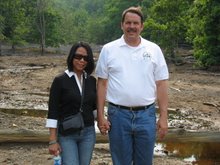Many believe that global warming is responsible for climate change, including extreme weather, such as storms of greater intensity. If Darwin is right, then the people of New Orleans are among those who should be more responsive to change. Instead, many choose to rebuild again in the same location. While this group is an obvious candidate for change, could it be that the rest of us fail to see the dangers that lie ahead? Is this the time to respond to the changes we see happening today? The answer is yes, absolutely! Just because you don’t live in a costal city doesn’t mean you’re out of harms way. Perhaps costal areas will be the first victims of the effects of global warming, but the rest of the country will surely follow."It is not the strongest of the species that survives, nor the most
intelligent, but the one most responsive to change."Charles Darwin
Sadly, our government lacks the wisdom needed to formulate an intelligent plan. Its solution is to build bigger levees and help people rebuild in areas where nature doesn’t want them to. Money that could be spent in a sensible relocation effort is instead wasted on projects that are destined to fail. Money that could be spent to develop sustainable energy is instead spent on projects aimed at finding and using what little fossil fuels remain. In the absence of intelligent leadership, it is up to us as individuals to take the necessary actions to enhance our chances for survival. Stockpiling food and water will help to ride out the storm, but we need to plan beyond that. We need to think long-term.
The people most likely to survive are those who’ve already started to adapt. They’re not just moving out of costal areas, they’re moving out of heavily populated areas altogether. They’re growing their own food, and reducing or eliminating their need for public utilities. They realize that, in the event of a major disaster, it will be difficult to get food when a million of their neighbors are also looking for it. They’re learning skills that their great-grandparents knew well, such as growing food, food preservation, raising animals for food, hunting and fishing. And unlike their ancestors, they’re making their own electricity with solar panels, windmills, and micro-hydro systems. Life in a rural area presents an abundance of opportunities for sustainable living, many of which are not available in the city.
Besides our failure to plan for long-term emergencies, and our lack of survival skills, many of us lack the stamina to survive without automobiles and other modern conveniences. If you’re among this group, now would be a good time to get into shape. Walk, or ride a bicycle to work, if possible, or at least get some exercise several times a week. Eat healthy, and get plenty of rest. Don’t abuse alcohol, tobacco, or other drugs.
The idea of becoming self-sufficient might be a bit overwhelming if you haven’t worked at it in the past, but don’t let that stop you. The important thing is to get started. Think about your basic needs, and what you can do to meet those needs if traditional sources are no longer an option. You may have the additional task of taking care of very old or very young family members.
If a sudden change forces you into an emergency survival situation, you’ll enhance your chances for survival if you belong to a group of like-minded folks. You need not be an expert in every aspect of survival, as long as another member of your group is. You should be able to barter for goods and services.
Survival in the event of a major disaster is not the only reason to embrace sustainable living. For example, Les and Jane Oke were simply looking for a better way of life fourteen years ago when they decided to go off-grid. They managed to get out of debt, and replace noise and strife with contentment and a purpose for life. They, of course, understand doomsday scenarios, as indicated by these comments:
“….. the joy is in the fact that we could go on, endure if you will, any major blowout of industrial society.”
Or this one:
“When we run out of fossil fuel we will still be able to feed ourselves and produce our own power – we have achieved a state of sustainability in our life.”
Their website and online magazine offers some interesting insight into the pleasures and the hardships of this kind of lifestyle. You can find it here: http://www.off-grid-living.com/
On the other hand, you may choose to do nothing. If so, have you given any thought to what would happen to you and your family if a pandemic, natural disaster or a major terrorist attack were to occur? Imagine empty grocery store shelves, no gasoline, no running water, no electricity, and no natural gas service. Looting and riots will be common in many cities, and you’ll be afraid to leave your home. You may have enough food and water to last a few days, but what do you do after that?
John








3 comments:
Hi SJ,
I think that trying to deal with a major breakdown in society is not fruitful for most of us urbanites, and I don't think that such a scale of disaster is very likely, and indeed we're less damaging to the environment when huddled together densely AFAIK!
But reducing waste, being fitter, and being ready to cope with some wobbles (with some off-grid power, some stored water, etc) is a sensible way of blunting some of the duller edges. One of my elderly relatives was without drinking water for many many days recently after major flooding, and she put her WWII skills to use to help get by!
Rgds
Damon
Damon,
We are certainly less damaging to the environment when we're huddled together densly, but we're also more dependant on others. If help is slow to come, as it was for New Orleans residents after Hurricane Katrina, a lot of people will be competing for what little resources are available. sj
This is great info to know.
Post a Comment